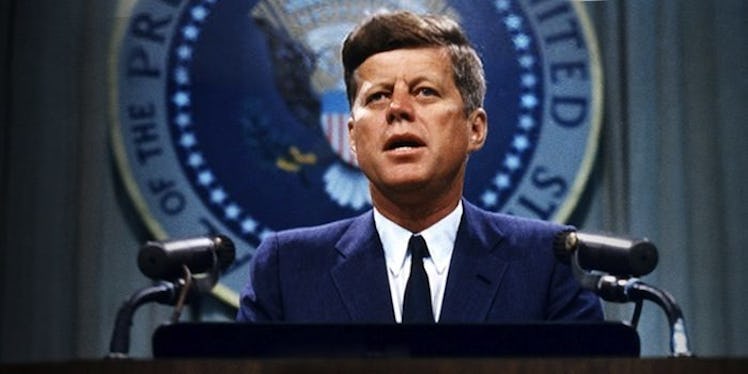
How 5 World Leaders' Mental Health Issues Shaped Our Entire History
Research conducted in 2008 by a Pentagon think tank suggests that Russian President Vladimir Putin has Asperger's syndrome.
According to the report, which was obtained by USA Today and released on Feb. 4, Putin has an autistic disorder which affects all of his decisions.
The study was conducted by Brenda Connors, an expert in movement pattern analysis at the US Naval War College in Newport, RI.
By studying his movements, Connors and her colleagues speculate that Putin carries a neurological abnormality.
Dr. Stephen Porges, a University of North Carolina psychiatry professor, is cited in the 2008 report, contending that Putin carries a form of autism.
But he later stated he never saw the finished report and he's reluctant to take a concerted stance on whether or not Putin really has Asperger's.
It's also impossible to prove this theory without giving Putin a brain scan. Yet, this might help explain why Putin is so defensive in terms of his facial expressions and behavior in social settings.
Could this also help explain why his foreign policy has been so reactive?
His actions in Ukraine have enraged the global community, and many have questioned his reasoning.
It's certainly an interesting line of inquiry, but it would be premature to make any broad conclusions in this regard.
Similarly, it's theorized that some of the most important leaders in history suffered from various genetic and mental disorders. In relation to Putin, it's important to note that Asperger's is not a mental illness, but a developmental disorder.
It's interesting to think our entire history might have been influenced by the mental health of various global leaders.
Here are five prominent world leaders who are believed to have had mental health problems.
1. Winston Churchill (Bipolar disorder)
Churchill reportedly suffered from bipolar disorder. His mood apparently fluctuated from paralyzing depression to ecstatic spurts of energy and activity.
This might help explain why he was such an impetuous individual. His dark moods granted him the insight to get the UK through WWII.
2. Adolf Hitler (Bipolar disorder)
Some believe Adolf Hitler had bipolar disorder, which would certainly help explain his manic and erratic behavior. This combined with an addiction to methamphetamines would explain how Hitler became increasingly irrational over time.
3. Abraham Lincoln (Depression)
It is no secret that Lincoln suffered from many depressive episodes. He was often treated by a physician for "melancholy."
Some believe that Lincoln's depression helped him see the world more clearly, making him a fierce realist and pragmatist in terms of his leadership.
4. Mahatma Gandhi (Depression)
While Gandhi is often perceived as the epitome of peacefulness and contentment, he suffered from depression. He also attempted suicide when he was younger.
It's theorized that his depression allowed him to be a more empathetic individual, a sentiment that inspired his non-violent philosophy.
5. John F. Kennedy (Depression and manic episodes)
Kennedy's medical records reveal he suffered from depression and manic episodes. This caused him both to falter and to have high levels of energy during his presidency.
Some believe this is why his first years in office were relatively uneventful. His doctors helped him get things under control, however, which might explain why his final year in office was so historic in terms of civil rights and the Cold War.
Thus, mental illness didn't always impact the decision-making of these leaders negatively. Rather, it seems to have often served as both a source of great strength and enlightenment.
In order to address the world's many problems, it's necessary to understand the nature of suffering.
Citations: Madness And Leadership Hand In Hand (NPR), Churchill chance and the black dog (BBC), Depression in Command (The Wall Street Journal), Why we need more mentally ill leaders (Salon), Pentagon 2008 study claims Putin has Aspergers syndrome (USA Today)